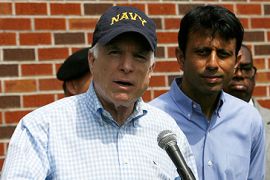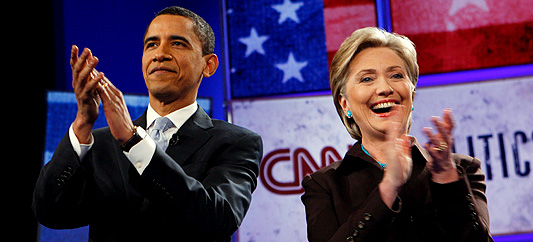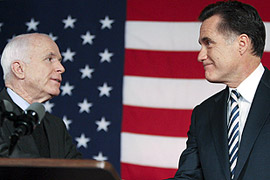US election diary: Tough choices
Why picking a vice-president is no easy decision for the US presidential hopefuls.

 |
| Some Democrats are tempted by the prospect of an Obama-Clinton “dream ticket” [EPA] |
Another set of US election primaries, another split decision: Democratic presidential hopeful Barack Obama scored a big win in Oregon and Hillary Clinton won by a landslide in the southern state of Kentucky.
The basic situation in the Democratic race has changed little, however. Obama has all but clinched the nomination and Clinton faces nearly impossible odds of defeating him.
I hesitate to make any predictions as to when Clinton will bow to the inevitable and concede the race.
The first week of June will see the last of the primaries in Puerto Rico, South Dakota and Montana, followed by a time for decision on the part of the 200 or so remaining uncommitted superdelegates.
So, with Obama and John McCain, the presumptive Republican candidate, having all but wrapped up the presidential nominations of their respective parties, the next big event on the political agenda is likely to be the naming of their vice-presidents.
A unifying force?
Choosing those running mates will be an important milestone for both men.
In the US system, vice-presidents act as presidents-in-waiting: They take over if the commander in chief dies, resigns or becomes incapacitated.
Fourteen times in US history, vice-presidents have become president – nine took office when the president died in office and five sitting or former vice presidents were elected to the higher post.
Traditionally, vice-presidents are chosen to add some geographical balance or other political value to the ticket.
For example, if the presidential nominee is from New England, he or she might seek to attract votes in southern states by choosing a southerner as his running mate – as did John Kerry in 2004 when he chose John Edwards, the North Carolina senator.
Or, if the party is divided into factions, a presidential nominee might pick a running mate who can act as a unifier: That is what conservative Republican Ronald Reagan did in 1980 by picking moderate Republican George H W Bush.
| Previous entries |
|
|
Until very recently, the vice-presidency was a job with very little power or prestige.
John Nance Garner, Franklin Roosevelt’s vice-president for two terms, famously compared the job to “a bucket of warm spit” (although it is said that reporters changed the last word from something less printable in a family newspaper).
Nowadays, however, we know that Dick Cheney, the current vice-president, took that less than glamourous post and turned it into one of the most powerful in the executive branch.
The next vice-president, whoever he or she may be, is unlikely to emulate Cheney’s ruthless grasping of power, but he or she will be an important member of the administration, nonetheless.
McCain’s dilemma
For McCain, the vice-presidential pick will be especially important for another reason: Age.
If he is elected, McCain will take office at age 72 – the oldest incoming president in history.
So, McCain’s choice will need to be someone who the public can be confident will be able to do the president’s job.
He is likely to want someone who can help reassure right-wing Republicans, many of whom still harbour doubts about McCain’s conservative credentials.
Of the names floated for McCain’s number two, the most well known is Mitt Romney.
 |
| There is no love lost between McCain, left, and Mitt Romney [EPA] |
McCain’s one-time rival for the nomination would help McCain with some conservatives and he has the ability to raise large amounts of money, something McCain needs badly since he trails far behind Obama in fundraising.
But the often nasty exchanges between the two men in their debates during the campaign made it clear they do not like one another at all.
Secondly, there is Carly Fiorina. The former chief executive officer of Hewlett-Packard has been by McCain’s side a great deal recently.
She is one of his economic advisers and is chairwoman of the Republican National Committee’s “get out the vote” and fundraising committee.
Her presence on the ticket might attract women, and reassure Wall Street.
But Fiorina was responsible for large numbers of job cuts when she ran HP, and was booted out of the CEO’s job abruptly due to the company’s disappointing performance – not exactly the kind of baggage a vice-presidential candidate needs.
Then there is Charlie Crist. The popular governor of Florida helped McCain win that state’s primary with a crucial endorsement.
Florida is a perennial battleground in presidential politics and being assured of a win there could allow McCain to concentrate his scarce resources elsewhere.
But Crist is a relative newcomer to politics, having been governor for little more than a year, and a virtual unknown on the national scene
Finally, there is Bobby Jindal, the 37-year old new governor of Louisiana and the first Indian-American governor in US history.
He is popular among right-wing conservatives and his youth would send a powerful message. But his youth also might unpleasantly focus attention on McCain’s own age.
McCain has invited Romney, Crist and Jindal to spend time with him at his home this weekend to discuss the nomination.
Democrat speculation
| In focus |
 In-depth coverage of the US presidential election |
For the Democrats, there is almost frenzied speculation as to whether Obama will ask Clinton to join him on the ticket.
Polling shows large numbers of Democrats approve of this so-called “dream ticket”.
But it is questionable whether Clinton would even want the vice-presidency – and if she did accept it, would Obama really want former president Bill Clinton as part of his extended official “family”?
Other possible Obama running mates include Kathleen Sibelius. She is the governor of Kansas and a rising star in the Democratic party.
Obama has a sentimental tie to her state, as it was where his late beloved maternal grandparents came from – a fact he often refers to in campaign events in order to demonstrate his middle-American roots.
Sibelius could also help win votes among women who may be disappointed by Clinton’s loss.
However, with Obama already having trouble attracting white males to support him, would having a woman on the ticket really help, or hurt?
Generating attention
Then there is Sam Nunn, the former Georgia senator who is a foreign policy elder-statesman with strong national defence credentials.
He would bring gravitas and experience to Obama’s ticket, and may help him amongst Southern whites. However, Nunn will turn 71 in September, and his two decades as a Washington insider clash somewhat with Obama’s promise to bring radical change to American politics.
Next we have Chris Dodd, a liberal Connecticut senator and a former Democratic candidate for the presidential nomination.
He has solid experience in both domestic and foreign policy. Connecticut, however, is a small and solidly Democratic state, and its hard to see how Dodd helps the ticket in any broader sense.
And finally there is Tim Kaine. As governor of Virginia, Kaine could help Obama carry a state that has been turning increasingly Democratic in recent elections.
Kaine is also a devout Catholic who spent time as a young man doing missionary work in Central America; Obama has run poorly among Catholics – in particular in places like Ohio and Pennsylvania – and appears to need help convincing some Christian voters nationwide he is sufficiently religious.
Whoever their running mates turn out to be, Obama and McCain are likely to announce their choices sometime in the next month.
In the manner, they will be hoping to generate maximum media attention in the slow summertime period between the last primaries and the nominating conventions in August and September.
